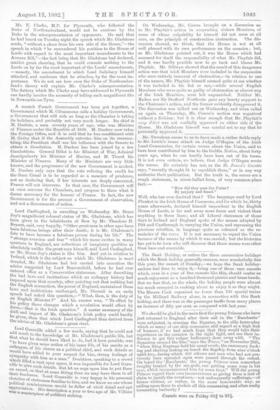Mr. E. Clarke, M.P. for Plymouth, who followed the Duke
of Northumberland, would not be outdone by the Duke in the misrepresentation of opponents. He said that he had heard on Tuesday night the speech which Mr. Gladstone made, "without a cheer from his own side of the House,"—the speech in which '.' he surrendered his position to the House of Lords with regard to the most important amendments to the Arrears Bill,"—the fact being that Mr. Gladstone had declared, amidst great cheering, that lie could concede nothing to the Lords on by far the most. importaut of the Lords' amendments, —namely, the amendment to which Lord Salisbury himself attached, and confesses that he attaches, by far the most im- portance. We do not see how even the Duke of Northumber- land's theory will explain Mr. Clarke's misrepresentation. The flattery which Mr. Clarke may have addressed to Plymouth can hardly involve the necessity of telling such magnificent fibs in Newcastle-on-Tyne.






























 Previous page
Previous page